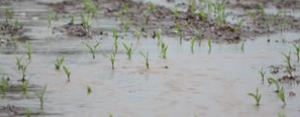Soil Erosion Caused by Midwestern Rain Could Have Lasting Impact on Corn Crops

Soil erosion from spring rain could affect this year's corn crop
According to a recent AgWeb article, spring rain across the Midwest has caused increased soil erosion in many areas, which could have a lasting effect on corn crops later this year.
Due to wet and cold weather conditions across most of the Corn Belt, U.S. farmers are expected to produce less corn this spring than in previous years. A University of Missouri soil scientist, Newell Kitchen, says in the AgWeb article that the planting delays caused by wet weather meant a lot of producers had a narrow window of opportunity in which to plant their crops.
Kitchen, who is also a soil scientist for the USDA Agricultural Research Service, says “Even the untrained eye of citizens who don’t think about agriculture on a day-to-day basis can see the erosion on side slopes. From the freeway between Kansas City and St. Louis, it doesn’t take much to see the scars of erosion that has taken place with the heavy water accumulation.”
Kitchen claims that the rainy weather conditions meant that “a big portion of the corn crop [was] planted at just about the same time.” While he feels a dry period occurring at the same time the corn is pollinating could be “catastrophic,” he says the window for planting soybeans is still fairly wide.
AgWeb reports “Wheat has kept erosion down and preserved moisture, so conditions could be favorable for double-crop beans.” When it comes to corn specifically, Kitchen predicts the damage caused by soil erosion could have a “serious impact” on crops later this season.